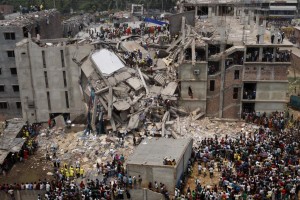“The deadliest accident in the history of the garment industry…killed 1,100 workers in Bangladesh.” (Fortune) The disaster is preventable if the factory owner followed the building code. Instead of doing that, he “urged workers to return to their jobs despite evidence that the building was unsafe.”(nytimes)
The owner’s decisions were against business ethics. For one, according to Freeman’s Stakeholder Theory, employees are stakeholder. The factory should provide its employees with proper security measures, not hazards. Also, as a supplier, the factory was not being responsible to its customers. As a result, some “Western clothing companies that rely on the cheap labor in Bangladesh” are rethinking about their decisions. At last, the owner was not responsible to its investors. People invested money into the factory or its related firms to get more returns. However, the owner was unethical in the sense that the resources, including labor(employees) and capital(the facility&machines) are wasted because of his decision. These resources could be used to increase profits. According to “Social Responsibility of Business is to Increase Profits”, such action is against business ethics. In addition, such a scandal ruined the image of the company and affected those who invested in it.
Since the owner violated the interests of multiple stakeholders: employees, customers and shareholders, he is highly unethical
